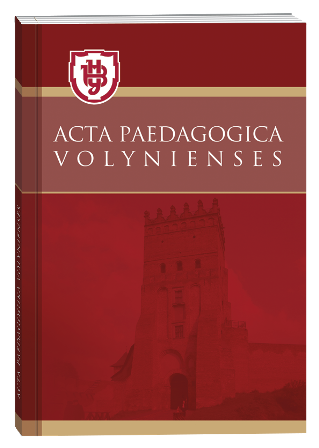ФОРМУВАННЯ КОМУНІКАТИВНИХ НАВИЧОК У ПРОЦЕСІ ПРОФЕСІЙНОЇ ПІДГОТОВКИ ЖУРНАЛІСТІВ В УНІВЕРСИТЕТАХ США
DOI:
https://doi.org/10.32782/apv/2022.1.2.20Ключові слова:
журналістика, професійна підготовка, США, комунікація, критичне мислення, міжкультурна комунікаціяАнотація
У статті детально вивчено професійну підготовку журналістів у США з акцентом на роль комунікативних навичок розвитку. Наголошується на важливості формування комунікативних навичок у процесі професійної підготовки журналістів в університетах США. Виявлено різноманітні фактори, які впливають на розвиток комунікативної компетентності майбутніх медіафахівців. Проаналізовано умови формування комунікативних навичок журналістів у вищих навчальних закладах США. Обґрунтовано розвиток критичного мислення, створення та виголошення риторичних промов, монологів та діалогів як найважливіших компонентів комунікативної компетентності. Доведено необхідність розвитку міжкультурної комунікативної компетенції журналістів у США з метою вільного спілкування та розуміння людей різного рівня на міжнародній арені. Методологічною основою статті є сукупність наукових підходів, які застосовуються до вирішення проблеми формування комунікативних навичок журналістів у закладах вищої освіти США (аксіологічного, акмеологічного, міждисциплінарного), принципів об’єктивності, цілісності, гуманізації, фундаментальності, безперервності освіти дорослих; педагогічні та психологічні уявлення про сучасний розвиток освіти; поєднання теоретичних і практичних знань. На основі проведеного дослідження зроблено висновок, що професійна підготовка журналістів в університетах США має бути більш орієнтована на практичне застосування комунікативних навичок шляхом використання інноваційних медіатехнологій за налагодження стосунків із громадськістю, вміння правильно виступати, впливати та переконувати людей, вести переговори на високому рівні, правильно представляти та обмінюватися соціальними та культурними цінностями.
Посилання
Амеліна С.М. Гуманізація процесу формування культури професійного спілкування майбутніх фахівців. Е-журнал «Педагогічна наука: історія, теорія, практика, тенденції розвитку». 2009. URL: http://www.intellectinvest.org.ua/pedagog_editions_e-magazine_pedagogical_science_arhiv_pn_n2_2009_st_15/
Бобаль Н.Р. Використання технологій розвитку критичного мислення у навчанні майбутніх журналістів роботі з інформацією. Педагогіка і психологія професійної освіти. 2014. № 2. С. 83–89.
Козак С.В. Профессионализм преподавателя иностранного языка как фактор интенсификации процесса формирования у будущих специалистов иноязычной коммуникативной компетенции. Науковий вісник ПДПУ ім. К.Д. Ушинського. 2000. № 7. С. 92–96.
Манакін В.М. Мова і міжкультурна комунікація : навчальний посібник. Київ : Видавничий центр, 2012. 285 с.
Сергеенко А.А. Особенности развития коммуникативной компетентности студентов-журналистов в условиях вуза. Сборник трудов III Международной научно-практической конференции: «Журналистика и медиаобразование-2008». Белгород : Изд-во Белгород. гос. ун-та., 2008. Т. 2. С. 303–307.
Kawamoto K. Enhancing citizen journalism with professional education. Media development, 2013. URL: https://centreforcommunicationrights.org/cdn.agilitycms.com/centre-for-communication-rights/Images/Articles/pdf/Kawamoto.pdf
Kosolova A.A., Poplavskaya N.V. Intercultural Communication and Modern Media Education. Athens : Atiner’s Paper Series, 2013. P. 5–16.
Paul R.W. Critical Thinking: What Every Person Needs To Survive in a Rapidly Changing World. Tomales, Canada : Foundation for Critical Thinking, 2012. 572 p.
Poynter Institute for Media Studies. Core skills for the future of Journalism, 2018. URL: https://courses.poynter.org/courses/coursev1:newsu+newsu_core_skills_survey14+2014_1/about
Ruminski H., Hanks W. Critical Thinking. Media Education Assessment Handbook. Mahwan, USA : Lawrence Erlbaum Assoc. Publishers, 2016. 376 p.







